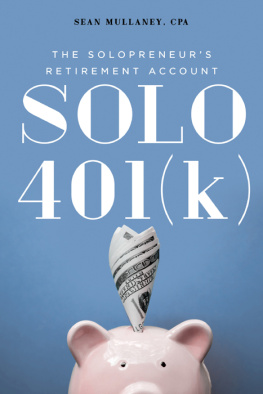Rebecca Seal - Solo: How to Work Alone (and Not Lose Your Mind)
Here you can read online Rebecca Seal - Solo: How to Work Alone (and Not Lose Your Mind) full text of the book (entire story) in english for free. Download pdf and epub, get meaning, cover and reviews about this ebook. year: 2021, publisher: Gallery Books, genre: Religion. Description of the work, (preface) as well as reviews are available. Best literature library LitArk.com created for fans of good reading and offers a wide selection of genres:
Romance novel
Science fiction
Adventure
Detective
Science
History
Home and family
Prose
Art
Politics
Computer
Non-fiction
Religion
Business
Children
Humor
Choose a favorite category and find really read worthwhile books. Enjoy immersion in the world of imagination, feel the emotions of the characters or learn something new for yourself, make an fascinating discovery.

- Book:Solo: How to Work Alone (and Not Lose Your Mind)
- Author:
- Publisher:Gallery Books
- Genre:
- Year:2021
- Rating:5 / 5
- Favourites:Add to favourites
- Your mark:
- 100
- 1
- 2
- 3
- 4
- 5
Solo: How to Work Alone (and Not Lose Your Mind): summary, description and annotation
We offer to read an annotation, description, summary or preface (depends on what the author of the book "Solo: How to Work Alone (and Not Lose Your Mind)" wrote himself). If you haven't found the necessary information about the book — write in the comments, we will try to find it.
Solo: How to Work Alone (and Not Lose Your Mind) — read online for free the complete book (whole text) full work
Below is the text of the book, divided by pages. System saving the place of the last page read, allows you to conveniently read the book "Solo: How to Work Alone (and Not Lose Your Mind)" online for free, without having to search again every time where you left off. Put a bookmark, and you can go to the page where you finished reading at any time.
Font size:
Interval:
Bookmark:


Im writing these words in the middle of the coronavirus crisis. Its too early to say what it will do to the world in the long run, but there is one thing I am sure of: it will change how we work. It is now inconceivable to argue that remote or flexible work is impossible when people have been doing it, against all odds, for months. Millions, if not billions, of people have had their first taste of working alone. Some will have fallen in love with it. Others will have struggled. Many will have done both. Still others will have lost their employment and started something new, by themselves.
I started this project years before most of us even knew what a coronavirus was, but my hope, now, staring this crisis in the face, is that it will be more useful than I could ever have imagined. Because this book was always meant to be for anyone who works alone, whether for a few hours a day in the corner of a bedroom, once a week at a rented desk in a shared office, in a workshop, studio, van or garden, or all day, every day and everywhere, with a laptop and a phone. Its not about whether to become a limited company, how to set up a website or when to pay your taxes. Instead, I want to help you cope with the demands of solitary work, using the best and most recent ideas in psychology, economics, business and the social sciences to create a new and resilient way of thinking about and coping with working alone.
I want to help soloists work and live well.
Working for yourself is wonderful. Going solo is one of the best decisions I ever made. Working for yourself gives you the opportunity to do whatever it is youve always dreamed of doing and the chance to choose how, when and where you work. Working for yourself means having no boss to stifle your big ideas. Working for yourself is creative, self-directed and potentially more meaningful than working in the same old company, with the same old team, and in the same way every day.
Working for yourself is also terrifying. Working for yourself requires dredging your soul to find wells of self-reliance, bravado, optimism, hope, patience and grit. Working for yourself is tedious and monotonous, tiring and nerve-racking. Working for yourself means always working, always being on, always checking your emails. Working for yourself means having dozens of bosses, all thinking they are your first priority. Working for yourself means working at the weekend, working on holiday, working when youre ill. Working for yourself is lonely. Working for yourself is very, very hard.
All of these things are true, often all at the same time. Ive been solo for 11 years, after six years working as a journalist for the Observer. I have done or felt all of the above, as well as elated, desperate, despondent, confident, confused, fierce, scared, knackered, proud and 100 per cent committed to never going back to working in an office.
Five years into freelance life, I reached what felt like a terrible impasse. I had been working without pause, writing articles and books, often until eight or nine at night, or later if I was attending a work event. On Sundays, 48 weeks a year, I got up at 6am and made my way to a TV studio in north London, where I appeared on a live breakfast show (for the same reason, I hadnt been on holiday for several years). Id be home in time for a late lunch, giving me Sunday afternoons to regroup (or, um, drink unhealthy amounts of wine) before an early night in preparation for doing the whole thing again the next week. The years were rushing by in a haze of deadlines and presentations (under-) prepared in the back of taxis.
I felt an overwhelming need to say yes to every bit of work that came my way even work I hated; even work that paid badly because I was desperate to become established and fearful of losing my precious clients if I ever said no, or asked for a fairer fee, or a deadline extension. I wanted all my clients to think of me as the person who always delivered what they wanted, on time and to the brief.
I was making pretty decent money, particularly for a freelance writer, but I wasnt very happy on my hamster wheel. I was neglecting all the good things in life my friends barely saw me, my family felt left out and my partner and I didnt seem to be having much fun at all. Like me, he is self-employed, as a freelance photographer. Like me, he worked all the hours he could, and then some, bending until breaking point to keep his clients happy. Like me, he talked about work at the breakfast table, and we muttered about it when we turned the light off at night.
We finally talked about it one evening in our local pub. Over burgers and red wine, we made a plan; a set of rules about when we would work, in the hope that they would ease the pressure slightly: no working or talking about work before breakfast has been eaten; no working after 8pm; and no talking about work after 8pm either (we were allowed to break this one once a week, only if it was really necessary). No working at weekends (we were allowed to break this one once a month, and only in emergencies).
For a while, fencing in the time that we were allowed to do work and talk about work really helped. As anyone who has ever had to collect their kids from childcare, or care for an unwell or elderly relative, or had any regular and immovable commitment, will already know: you get more done when you have a finite and fixed amount of time in which to work. Conversely, as anyone who works alone from home will have experienced, when a working day can easily drift into being a working evening, with nothing in particular to stop it, it can be tough to buckle down and focus. (I later found out that enforcing start and end points on the working day, whether real or arbitrarily self-imposed, is a very popular topic in the productivity literature to which I am now happily addicted.)
As time passed, though, it was clear that the rules were not going to be enough although they stopped us actually doing work, the rules couldnt stop me thinking about it, chewing it over, silently, alone or in the dead of night. In theory, I loved my job and outwardly it looked as though I was living a freelance dream, but it was getting more and more difficult to find joy in what I did something which made me feel both ungrateful and, frankly, kind of cheated. Id worked so long and so hard to get here so why did it feel miserable? Why wasnt I revelling in the fact that I had a job I was supposed to love? Why was I incapable of taking time off? Why was my phone always in my hand or my pocket? Why did I need to check my emails before Id got out of bed each morning? What was wrong with me? Why couldnt I be happy with what amounted to a really good life?
Meanwhile, several of my friends decided to try working alone as well. Some actively chose to go solo and some were made redundant. Others changed career and because of what they wanted to do, had no choice but to work alone, even if they might have preferred a regular pay cheque. In the current job market, its almost impossible to find a permanent job if you want to be a personal trainer, tree surgeon, private chef or writer. A friend, a lawyer, started a consultancy business of one, because he couldnt see himself working in the cut-throat, corporate world of large legal firms for the rest of his working life. Lou, a friend from university, found that the only way she could control her career as a senior aid worker was to leave the international charity shed joined and become a consultant, helping non-governmental organisations respond quickly to humanitarian disasters. A successful marketing executive retrained as a make-up artist. Colleagues from my time working on newspapers became fiction writers and copywriters, or jacked in writing completely to run bed-and-breakfasts by the sea.
Font size:
Interval:
Bookmark:
Similar books «Solo: How to Work Alone (and Not Lose Your Mind)»
Look at similar books to Solo: How to Work Alone (and Not Lose Your Mind). We have selected literature similar in name and meaning in the hope of providing readers with more options to find new, interesting, not yet read works.
Discussion, reviews of the book Solo: How to Work Alone (and Not Lose Your Mind) and just readers' own opinions. Leave your comments, write what you think about the work, its meaning or the main characters. Specify what exactly you liked and what you didn't like, and why you think so.










